The Bear: How a show about a restaurant provides the best leadership takeaways
On the different dysfunctions of a team, conflict resolutions and leadership lessons
Some time ago I finished watching the TV series The Bear, and some parts of it keep resurfacing in my brain. And yes, you’ve guessed it. In order to declutter my mind, I’ll obviously need to write about it.
As I watched the show, my mind couldn't help but dwell on the various aspects of it that I come across in my daily work. “Hey, I know a guy that behaves like that and I have the same issues working with him“, or “Hey, I’ve seen my manager do the same thing to resolve a similar conflict“. What I found really cool about the show is that each main character seemed to be represented as an accentuated archetype of the different people you might encounter in your work environment: the controller, the perfectionist, the slacker, the over-achiever, the challenger, and somehow (after a really long struggle) the team manages to make it all work. We’ll get into how in a second. I also found bits of myself in almost every character and made me realise the issues I might be dealing with myself.
So what I want from this article is to present a reflection of the different dysfunctions of a team, different conflict resolutions, and what leadership lessons we can get from the show.
But first things first, what is the show about? The Bear unfolds the story of Carmen (Carmy) a young chef who, following his brother's death, returns to his hometown of Chicago. He inherits not only his family restaurant but also his brother's co-manager and a team of disorderly cooks. With experience in some of the world's finest restaurants, he is confident in transforming his family establishment into a culinary landmark. Easy, right? But what Carmy’s journey will unravel is an endless road of blockers: tight deadlines, challenging budget, difficult stakeholders, endless milestones, the pain of legacy work (in this case his brother’s huge unpaid debts), a ton of dependencies, unknown risks, burn out, lack of alignment, no shared vision, others’ pursue of self-interest over the well being of the team, personal commitments and so on. These are all real issues we’ve been dealing with which the show exposes in a really well-crafted manner.
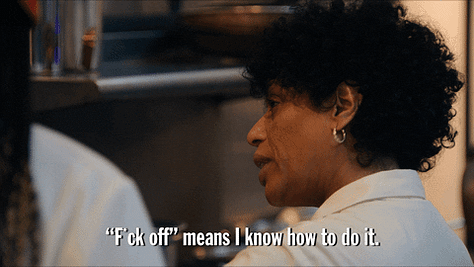
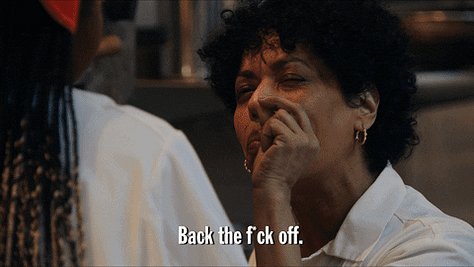
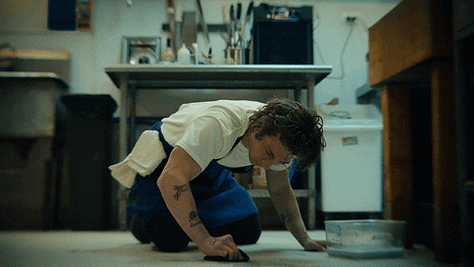
The Archetypes
I couldn’t help but analyse how well the characters fitted in the Enneagram’s classic archetypes roles.
Firstly, we have Tina, the Challenger, who is resentful of change and of new-comers. She likes to be independent and refuses any type of help, even if it’s needed. When Sydney is appointed chef de cuisine, she constantly undermines Sydney's authority and disregards her advice. Her respect is earned through reason and competency, and not through age or status.
Sydney is The Achiever, the innovator, passionate about cooking, and very hard-working. She is always open and pushes for change. And sometimes pushing for too much at once, especially when the team is already dealing with a lot, leads to conflicts, as we’ll soon see.
Carmy is The Enthusiast, the observant, focused, and experienced person but with high anxiety, a problem of expressing himself, and the deep frustration that comes when he fails at that. Carmy loses his temper quickly. He doesn’t know how to communicate with his team. Routine and control calm him down.
Ritchie is The Giver (you doubt it but listen to me), the stubborn, lazy guy who takes it out on every one out of fear and anger at his own life. But under the angry hood, he is the loving and caring guy who cares strongly for his family even if he doesn't show it in words.
Marcus is The Peacemaker and The Perfectionist, an emphatic and thoughtful person but his dedication to his passion as a baker sometimes stands in the way of seeing the bigger picture as he fails to put the team’s wellbeing first before his own. This can be seen when he decides to work on his special doughnut rather than keep up with Carmy’s orders and his work at the restaurant during a busy and stressful time.
Getting to know your teammates’ ways of working and needs is crucial to making the team work well together: develop a common language, identify strengths and weaknesses, and build an authentic culture that works for you and them.
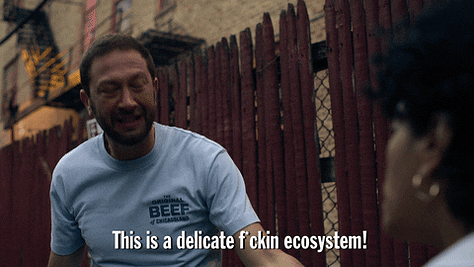
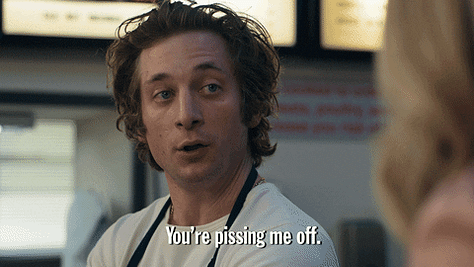
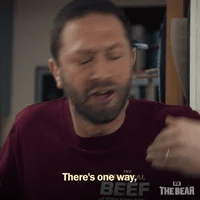
Lessons
I can’t share and analyse all the things I really appreciated about this show in the hope that I can still keep this article fairly short. So this is just a compressed list of lessons that came out from the different situations the team dealt with.
Grow your team; hire for passion and invest in skills
Later in the show Tina and Ebra are sent to culinary school. Marcus is sent to Copenhagen to learn from a well-known baker and Natalie (Carmy’s sister) is brought in as a project manager because she might be a good fit. Even Richie is sent to a restaurant called Ever because Carmy “believes in him“. This completely changes the team’s dynamics as this constant investment in their skills makes them feel seen and appreciated. So they improve and contribute, and most importantly learn to care and show up.
Don’t stop the learning
Another aspect I appreciated about the show was presenting how the team got unstuck when they were blocked (mentally). How they found inspiration and new creative ways to move forward. They would go outside and look at architecture, they would taste different foods, try out new restaurants, and travel to new places.
Now this sounds expensive, and the thing is growth is not only hard but it can also come with a price. This is where Carmy stepped in with his network. As a leader, you might not be aware of the different realities people come from. Not everyone has your network or resources.
During the show we can see Syd reading “Leading with the Heart: Coach K’s Successful Strategies for Basketball, Business, and Life” which emphasises the importance of leading with passion, empathy, and integrity. I haven’t read it but this approach to leadership will be emphasised in a lot of scenes during the show.Trust your team
One of my ‘but why’s’ moments was when Carmy sent Richie to a high-end, three-Michelin-star Chicago restaurant called Ever, to learn about how fine dining establishments are run. At this point, I was wondering how Richie fit in all of that. He’s the last person who would understand the importance of order and discipline. But what I wasn’t getting at that time is that Richie was battling some pretty big demons around his own ability and self-worth, like all of us out here, with our ever-growing imposter syndrome voice reminding us every day that we don’t belong and that we’ll never be good enough. And this is where Carmy steps in, and tells the crew over at Ever that he believes in Richie and his ability to work with people. Yes, Ritchie was supported by multiple people to be able to develop and thrive but without the trust from the others, maybe he wouldn’t have been able to step in and help Sydney when the tickets started to back up on opening night. Maybe he wouldn’t have been able to step up and become the “Expo” on that same night.
Cultivate your shared rituals
Do what works for you to solve the issues you’re dealing with.
Another aspect that made me “I need this in my relationship with others. This is good advice.” was Carmy and Sydney’s hand gesture. One of the things Carmy learned when he worked for another chef was that when tensions were high and there was no time to smooth things out, they would do this heart hand gesture to tell each other that they were sorry and that they could readdress the issue later. Sometimes too many emotions or having more high-priority issues on your mind don’t let you have the necessary bandwidth to deal with yet another issue. Having a shared ritual in your team for communicating the “I’m sorry, we’re both well-intentioned, but this is not a good time so let’s come back to this later.” can save your situation from overflowing into an out-of-control mess. Later on, Carmy and Sydney’s gesture ritual turns into a lack of communication and avoidance problem but we won’t talk about it now. What’s important is that while developing your rituals, you also need to adapt them or get rid of them accordingly when they don’t make sense for your team anymore. So, don’t continue doing something just because it used to work in the past.
Other communication rituals help them maintain safety, optimise their work and show each other respect, like “Behind!” - I'm walking behind you, so please don't back up or turn quickly because one of us probably has a piping hot pot of something., “Corner!” - I'm coming around the corner, so be aware., “Hands”: Someone, please come grab this food and deliver it to the customer while it's hot. “Thank you, Chef.”Show respect
Talking about respect, I really enjoyed the “Yes, Chef“ acknowledgment. Even if they didn’t agree with one another, they would say “Yes, Chef“ as a type of “No matter what you're saying or asking, I hear you” and I find it a nice and thoughtful way of showing respect.
Take Ownership
Another important lesson is shown during Ritchie’s time at Ever. During a staff meeting, a member of the team asks who was responsible for a smudge on a plate during a past service. The problem was not the smudge but that no one owned it. No one stepped up. Haven’t we been in similar meetings at work? Realising that something as small as that detail shouldn't matter, but it does. It matters because it’s proof of the team’s culture - a lack of ownership where no one will try to improve a process they’re not responsible for.
“We're not children. It's okay to make mistakes. We can smudge things, but we need to own up to them with immediacy, integrity, and honesty.” (scene)Be customer-obsessed
Yet another interesting subject presented during Richie’s time at Ever is how much emphasis an established luxury restaurant puts on attention to detail. Some customers were chatting at their table about how disappointed they were to leave Chicago without trying the deep-dish pizza. The servers listened to the guests and carried the message to the kitchen, where they tracked down a real deep-dish pizza, which the chef remixed and sent it out to be served. Why is this important? The end product is not only the food but also the customer experience. Isn’t it the same in the tech space? The attention to detail, going above and beyond to understand your users and make their journey more enjoyable is what sets apart a successful company from the others.
Experiment, build, and break into small iterations
When Syd and Carmy were working together on setting up the menu, they would start small. Experiment. Fail. Try Again. Fail some more. Try something else. When something works, go from there. Iterate.
Discover and embrace your leadership style
Not everyone has the same talents or skills, so we all have different ways of conquering a problem. As so beautifully presented in the show, Richie has a way with people, Carmy brings with him his expertise, and Syd is the relentless innovator. While they all struggled for power at the beginning, they learned when it was time to take the lead and when it was time to take a step back and let the others do their thing.



"The Bear" serves as a captivating reflection of the intricacies that make a team work together, their diverse personalities, and ways of working. What adds further to the show's brilliance is its portrayal of how the team manages to make it all work. It’s a journey full of frustration, high cortisol levels, and sometimes desperation but when everybody works towards the same goal, nice things start to happen.


